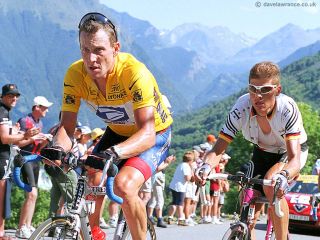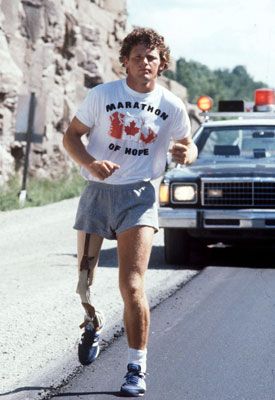Trauma
Were Cancer Drugs Lance Armstrong’s Best Performance Enhancers?
Do traumatic experiences make us grittier?
Posted August 31, 2012
If you’re like most Americans, you probably don’t know who Terry Fox is. In 1980, he accomplished an act of athletic endurance that seems almost, well... unendurable. He also has something in common with an athlete everyone knows about. His name is Lance.
Lance Armstrong Lance Armstrong

Lance Armstrong
Lance Armstrong
But there’s no controversy about this: Lance worked unimaginably hard to win. His training was, apparently, even more miserable than his competitors’ training. And the race itself was even more grueling. He beat the toughest opposition in the world (some of whom may have been doping too, including the teammates who have accused him) in one of the toughest athletic events in history.
Grit
What inspired Lance’s grueling dedication? Why do some people never give up? According to Dr. Angela Duckworth, the answer is grit. Like conscientiousness or extraversion, grit is a personality trait that we carry with us.
Grit is passion and perseverance for long-term goals.
Grit predicts high achievement, even after controlling for variables like talent and IQ. This has been shown in a diversity of populations ranging from competitors in the National Spelling Bee to cadets at West Point to salesmen in the workforce.
How to develop grit
It’s one thing to know grit is important. It’s quite another to know how to get grittier. How did Lance do it? He attributes his grit to his struggle with cancer. He has said that the purposefulness and intensity of his training increased dramatically following his illness.
“Without cancer, I never would have won a single Tour de France.”
This is anecdotal evidence at best. So can experiences really make you grittier? And what we all really want to know is, how can I get more gritty? (NASA, NFL coaches, and many others have been knocking on Dr. Duckworth’s door asking this question.)
Most of us would prefer to do it without suffering through cancer. (It's possible that the door swings both ways--training hard, e.g., running marathons, might increase grit across the board.) Suffering may be a necessary part of the path to grittiness. This path relates to a psychological construct called survivor mission, which is the drive that develops in some survivors of trauma to right the wrong they experienced.
Individuals with survivor mission abound. Consider the student survivor of the Virginia Tech massacre who founded a gun control organization, or Barbara Kowalcyk, who become a food safety advocate after her son was tragically killed by an E. coli infested hamburger. Organizations like Mothers Against Drunk Driving and the Michael J. Fox Foundation were likewise founded by survivors impassioned by problems they had experienced. So was Livestrong, Lance Armstrong's foundation.
Terry Fox

Terry Fox
And this brings us back to Terry Fox. Soon after he graduated from high school, he learned that he had cancer. His leg was amputated and he suffered through months of chemotherapy. In addition to physical suffering he had the emotional burden of losing a leg and possibly dying. But what seemed to hurt Terry most was being in the hospital and watching other children around him die.
Terry had a survivor mission. In 1980, when he was 21, he set off to run across Canada. His goal was to run a marathon a day. On one natural leg and one artificial one. He also stopped to give speeches to ever-growing crowds along the way, to raise as much money as he could for cancer research.
Terry avoided seeing doctors during his survivor mission. He didn’t stop running until, when he finally went to the hospital, he was told something he seemed to already know for himself: the cancer was back. He died soon after.But he ran over 3,000 miles in 143 days and inspired a nation along the way. The Terry Fox foundation has raised more than $500 million for cancer research.
The bottom line
Did cancer make Lance Armstrong and Terry Fox grittier? Research on how grit develops is still in its infancy. The real answer is, we don’t have the data. For every Michael J. Fox and Barbara Kowalcyk, there are many others who do not respond to suffering as productively they did. And clearly adversity isn’t all one needs to succeed, as Paul Tough explores in his new book How Children Succeed (reviewed by Annie Murphy Paul here; also see Steven Pinker’s response, which discusses the genetics of grit, here.)
Still, maybe Nietzsche right: What doesn’t kill you makes you stronger.
Guest blogger Lauren Eskreis-Winkler, a graduate student at the University of Pennsylvania, helped write this post.




